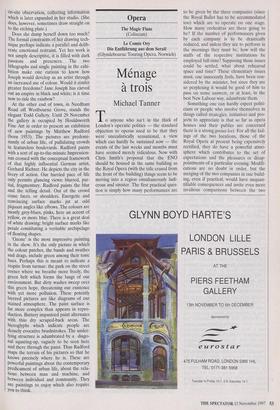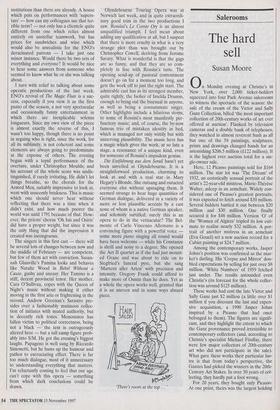Opera
Le Comte Ory
Die Entfiihrung aus dem Serail (Glyndebourne Touring Opera, Norwich)
Ménage
a trois
Michael Tanner
To anyone who isn't in the thick of London's operatic politics — the standard objection to operas used to be that they were unrealistically sensational, a view which can hardly be sustained now — the events of the last weeks and months must have seemed merely ridiculous. Now with Chris Smith's proposal that the ENO should be housed in the same building as the Royal Opera (with the title erased from the front of the building) things seem to be moving into a region simultaneously ludi- crous and sinister. The first practical ques- tion is simply how many performances are to be given by the three companies (since the Royal Ballet has to be accommodated too) which are to operate on one stage. How many orchestras are there going to be? If the number of performances given by each company is to be drastically reduced, and unless they are to perform in the mornings they must be, how will the staffs of the respective institutions be employed full-time? Supposing those issues could be settled, what about rehearsal space and time? These elementary issues must, one innocently feels, have been con- sidered by the minister, but since they are so perplexing it would be good of him to pass on some answers, or at least, in the best New Labour way, adumbrate them.
Something one can hardly expect politi- cians or people who involve themselves in things called strategies, initiatives and pro- jects to appreciate is that so far as opera houses and their publics are concerned there is a strong genius loci. For all the fail- ings of the two locations, those of the Royal Opera at present being expensively rectified, they do have a powerful atmo- sphere which contributes to the set of expectations and the pleasures or disap- pointments of a particular evening. Modifi- cations are no doubt in order, but the merging of the two companies in one build- ing, even if practical, would have unquan- tifiable consequences and invite even more invidious comparisons between the two institutions than there are already. A house which puts on performances with 'supers- tars' — how can my colleagues use that ter- rible term? — not only has a clientele quite different from one which relies almost entirely on unstellar teamwork, but has prices for sandwiches and wine which would also be unrealistic for the ENO's deracinated patrons — I take just one minor instance. Would there be two sets of everything and everyone? It would be nice to hear some answers from someone who seemed to know what he or she was talking about.
I turn with relief to talking about some operatic productions of the last week. ENO's revival of The Magic Flute is a suc- cess, especially if you view it as the first panto of the season, a not very spectacular and occasionally funny entertainment in which there are inexplicable solemn longueurs. Since my own view of the piece is almost exactly the reverse of this, I wasn't too happy, though there is no point in arguing who is right, since the work, for all its sublimity, is not coherent and some elements are always going to predominate at the expense of others. The evening began with a tepid performance of the overture, under Christopher Moulds; and his account of the whole score was undis- tinguished, if rarely irritating. He didn't let things breathe, so the chorals for the Armed Men, suitably impressive to look at, went with unseemly briskness. This is music which one should never hear without reflecting that there was a time when it didn't exist, and how much poorer the world was until 1791 because of that. How- ever, the priests' chorus 'Oh Isis and Osiris' did have a proper weight, but since it was the only thing that did the impression it created was incongruous.
The singers in this first cast — there will be several lots of changes between now and the middle of February — are competent, but few of them act with conviction. Susan- nah Glanville's Pamina looks and behaves like Natalie Wood in Rebel Without a Cause, gushy and uneasy. Her Tamino is a stiff, decent provincial tenor. Her mother, Cara O'Sullivan, copes with the Queen of Night's music without making it either moving in the first aria or frightening in the second. Andrew Greenan's Sarastro pre- sides over a fashionably mutinous collec- tion of initiates with muted authority, but in decently rich tones. Monostatos has fallen victim to political correctness, being not a black — the text is outrageously altered here — but a tall camp figure prob- ably into S/M. He got the evening's biggest laughs. Papageno is well sung by Riccardo Simonetti, but he hams up the humour and pathos to excruciating effect. There is far too much dialogue, most of it unnecessary to understanding everything that matters. I'm reluctantly coming to feel that our age can't cope with this opera — something from which dark conclusions could be drawn. Glyndebourne Touring Opera was at Norwich last week, and in quite extraordi- nary good trim in the two productions I saw. Rossini's Le Comte Ory is an almost unqualified triumph. I feel mean about adding any qualification at all, but I suspect that there is more cruelty in what is a very strange plot than was brought out by Christopher Cowell, deriving from Jerome Savary. What is wonderful is that the gags are so funny, and that they are so com- pletely in line with Rossini's taste. The opening send-up of pastoral contentment doesn't go on for a moment too long, and gets the work off to just the right start. The admirable cast has as its strongest member, quite rightly, the Isolier of Imelda Drumm, enough to bring out the bisexual in anyone, as well as being a consummate singer. Other highlights include a hilarious storm, to some of Rossini's most manifestly per- functory music; and, of course, the by-now famous trio of mistaken identity in bed, which is managed not only wittily but with unnerving plausibility. The music here has a magic which gives the work, at so late a stage, a resonance of a unique kind, even for someone of Rossini's impudent genius.
Die Entfiihrung aus dem Serail hasn't yet been unveiled at Glyndebourne. It is a straightforward production, charming to look at and with a real star in Mary Hegary's Blonde. She outsang and outacted everyone else without upstaging them. It seemed strange to hear huge quantities of German dialogue, delivered in a variety of more or less plausible accents by a cast none of whom is a native German speaker, and solemnly surtitled: surely this is an opera to do in the vernacular? The Bel- monte of Carlo Vincenzo Allemano is a convincing figure with a powerful voice some more piano singing all round would have been welcome — while his Constanze is shrill and noisy to a degree. She opened the Act II quartet as if she had just mount- ed Grane and was about to ride on to Siegfried's funeral pyre, but she sang `Martern aller Arten' with precision and intensity. Gregory Frank could afford to make more of Osmin than he does. Yet as a whole the opera works well, granted that it is an uneven and in some ways absurd piece.
`There's room at the top











































































 Previous page
Previous page